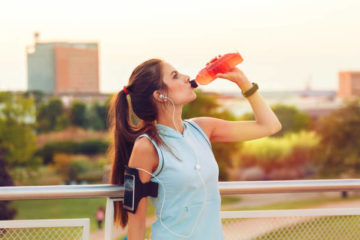One of the most effective types of ingredients in a pre-workout is electrolytes. These are minerals such as sodium, magnesium, potassium, chloride, and calcium.
Pre-Workout supplements with electrolytes are important because they help facilitate energy production and muscle hydration. If you look at products like LiquidIV or LMNT which are often marketed as ‘hydration products’ you will notice that their primary ingredients include a large dose of electrolytes.
One of the reasons these products have been so successful is they contain higher doses of electrolytes than other common sports drinks like Gatorade, and people notice how they are invigorated when they top off their electrolyte stores.
WHEN SHOULD YOU TAKE ELECTROLYTES AS PRE-WORKOUT
It is good to top off your electrolyte stores about 30-60 minutes before your workout, to ensure the fluid has time to reach all parts of your body. This gives your body time to process the electrolytes. If any of them play a diuretic or laxative role, you will have time to use the bathroom.
Preloading with electrolytes is just as important as your warm-up. With an additional dose of hydration before exercise, you are giving your body the boost it needs. Pre-hydration also gets your heart pumping and blood moving through your core and extremities to prepare for physical exertion. Taking electrolytes as a pre-workout is crucial for endurance athletes or anyone undertaking physical activity in hotter temperatures.
SHOULD YOU TAKE ELECTROLYTES DURING AND AFTER A WORKOUT?
Yes. In addition to taking electrolytes as a pre-workout, they work extremely well as intra-workout and post-workout fluids. Having prepared your body for exercise, it is essential to keep it hydrated during physical exertion. Water will usually suffice for shorter sessions, but electrolytes are useful if you are pushing your body to the limit.
Generally speaking, you should try to consume about 100-150ml of fluids every 20 minutes or so. Too much intake can make you feel sick, especially for high-endurance and intense activities. Because you sweat and breathe heavily during a workout, replenishing lost water and electrolytes should be your first priority after you have finished.
Using largely sugar-free products is the best way to go about this, as you will be able to rehydrate without worrying about your blood sugar levels.
What Doses of Electrolytes Should You Take?
There are so many factors to consider that it is impossible to give a precise number. Factors that matter include body size, time of day, what your last meal consisted of, and how much salt you have consumed in the last 8-12 hours. As a general guideline, we believe 200mg of sodium is the minimum that should be consumed as a pre-workout.
| Electrolyte | Dosage (range) |
|---|---|
| Sodium (as sodium chloride) | 200 – 1000mg |
| Potassium | 100 – 300mg |
| Magnesium | 50 – 300mg |
| Chloride (as sodium chloride) | 200 – 1000 mg |
| Calcium | 50 – 300mg |
Which type of athletes do electrolytes BENEFIT The most?
The main ingredients of sports drinks are water, electrolytes, and carbohydrates. Each is important for different aspects of exercise performance. A high dose of electrolytes can produce increased levels of performance in sports involving intermittent physical activities, which alternate between intense exercise and rest. These include American Football, soccer, cricket, rugby, ice hockey, basketball, athletics, boxing, kickboxing, jiu-jitsu, mixed martial arts, and many other sports.
Many studies have examined the effects of electrolyte consumption during continuous exercise lasting 1–4 hours or longer, such as running and cycling. Most of the research showed performance improvements when consuming fluids containing electrolytes.
A study in Medicine & Science in Sports & Exercise showed that a group of trained long-distance runners who consumed 38mg of sodium per kg of body weight in the 105 minutes before a workout were able to substantially outrun trained runners who consumed a placebo.
Another study showed a 7.8% performance increase among cyclists who consumed high amounts of sodium leading up to their event. Because of this, we can infer that sodium helps with endurance sports.
Do Electrolytes Improve Performance?
While most of the studies have shown performance increases in endurance sports, it stands to reason that electrolytes will extend performance for most activities that require exertion as they are fundamental to the production of energy and muscle hydration.
While electrolytes have been proven to improve performance, it is important to note that people who are trying to lose weight, need to burn more calories than they consume in a day. If electrolytes are unnecessary for the type of exercise you undertake, consuming them will provide you with additional calories that could significantly hinder your weight loss goals. However, some research has shown that consuming electrolytes during exercises like running does not impact the calories used during exercise.
Consider whether the type and duration of the exercise you undertake needs electrolytes and be aware of how many calories you consume from these fluids.
Related Posts:
- Pre-Workout Ingredients, Dosage & Importance
- Best Pre-Workout for Running
- Best Immunity Boosting Supplements
- Best Pre-Workout Supplements for Obstacle Course Racing
